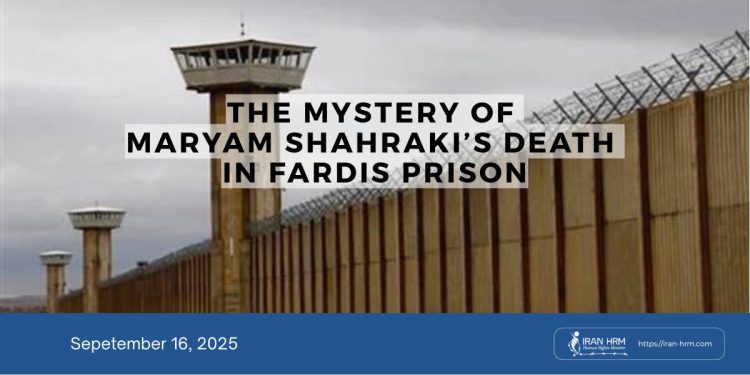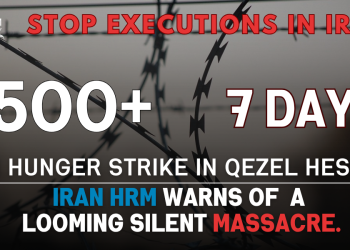Fardis Prison in Karaj has once again become a stark symbol of human rights violations in Iran. This time, the name of Maryam Shahraki, a 40-year-old woman and mother of two young children, has made headlines; a woman who was imprisoned solely for her inability to pay a financial debt of 300 million tomans and who lost her life as a result of medical negligence.
A Preventable Death
On the evening of Thursday, September 11, 2025, Maryam Shahraki was transferred to the Fardis Prison infirmary with severe chest pain. According to informed sources, she showed clear signs of a heart condition. However, the prison’s on-call physician, “Dr. Nasir,” attributed the pain to her stomach and, without conducting any diagnostic tests or referring her to a specialized medical center, prescribed only a few pills.
A few hours later, in the early morning of Friday, September 12, 2025, Maryam suffered a severe drop in blood pressure. Before she could be transferred to an external hospital, she passed away. Witnesses state that had she been sent to a well-equipped medical facility that same night, her death could have been prevented.
Small Debtors in Prison, Big Debtors Free
Maryam Shahraki was only a debtor prisoner; a woman who had neither committed a violent crime nor posed a threat to society. While large-scale financial and banking debtors evade punishment through political and economic connections, men and women like Maryam see their lives and families shattered because of minor debts. Her husband is also imprisoned in Karaj Central Prison due to the same case, leaving their two young children without parents.
Fardis Prison Infirmary Under Fire
The infirmary of Fardis Prison has for years been at the center of prisoners’ complaints. Repeated reports indicate that the physician in charge has frequently dismissed inmates’ medical concerns and prescribed superficial treatments or insufficient medications. Maryam Shahraki’s death is merely one case that came to light; many others are feared to have occurred in silence.
The Healthcare Crisis in Iran’s Prisons
With extreme overcrowding, lack of sanitary facilities, and negligent medical procedures, Fardis Prison poses a serious threat to the health of its inmates. Families have repeatedly reported that even in emergencies, prisoners face hours or even days of delay before being transferred to a hospital, and in many cases, such transfers are outright denied. The result of this policy is a rising toll of preventable deaths—a form of slow, silent torture against prisoners.







